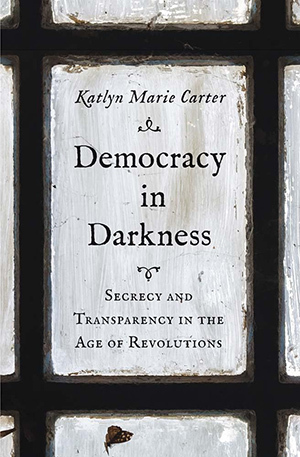
Most people would accept without scrutiny that secrecy poses a threat to modern democracies. In fact, the masthead of the Washington Post declares that “Democracy Dies in Darkness.”
However, for Katlyn Marie Carter, an assistant professor of history at the University of Notre Dame, that sentiment “obscures the odd truth that American democracy was in fact born in darkness.” Members of the Constitutional Convention, for example, not only met behind closed doors, but nailed windows shut and posted guards to protect against potential eavesdroppers.
There are lessons to be learned from democracy’s shadowy origins about both the dangers and potential utility of secrecy in a representative government, Carter said.
In new research, Carter explores how debates over secrecy and transparency in politics during the Age of Revolutions in the 18th century shaped modern democracy — and how they can shed new light on current examples of political misconduct from the mishandling of classified documents to the sending of emails over private servers.
“Often when we’re talking about what should be secret or transparent in government, the issue gets pulled out of historical context,” she said. “So, it’s important to remember that these debates aren’t entirely new. New technologies may change the scope and implications of them but, fundamentally, these are debates that have been going on since our government was established.”

Carter’s book, “Democracy in Darkness: Secrecy and Transparency in the Age of Revolutions” (Yale University Press, 2023), traces the trajectories of the American and French Revolutions as they embraced and eschewed secrecy to varying degrees and examines how representative democracy was shaped in the process.
“This moment in the late 18th century is really the origin of modern representative democracy,” she said. “Before this, representative government and democracy were seen as very different — even incompatible — things. So, part of the story I tell is how those two concepts came together to the point that today, we don’t even question that representative government is the main form of democracy in the modern world.”
Ironically, Carter wrote in the book, commitments to transparency in the governments born of revolution in America and France often resulted in losses of public trust and instability.
“When elected officials in the early United States and revolutionary France made claims to speak for the people, the use of secrecy actually strengthened those claims by deferring popular disagreements to after the promulgation of constitutions and the passage of laws rather than during the deliberative process,” she wrote.
The very meaning of democracy was changed in the process, she stated.
“By the end of the Age of Revolutions democracy meant something new: it was widely understood as a means by which the people ruled themselves through elected representatives, rather than a government necessarily characterized by the degree of popular participation in it.”
Carter also said that exploring the ways in which the French and U.S. governments grappled with issues of secrecy allows for a more nuanced comparison of the two revolutions.
“In the U.S., through the early leadership of George Washington, secrecy is used to create a particular style of representative politics that is a little more insulated,” she said. “And over time, things gradually open up more as we move toward the 19th century. In France, the trajectory is really the opposite. From the beginning, they’re very open and dedicated to the idea of publicity and transparency, not just rhetorically, but practically. They work on their constitution with open doors and big audiences. And it’s only gradually that they start to reintroduce more secrecy into their legislative processes.
“But in both cases, it’s a very central concept to how these governments are formed in ways that haven’t really been recognized.”
Moving into the late 20th and 21st centuries, Carter sees a marked popular disavowal of secrecy in government that, she argues, may overlook some of its potential benefits.
“I started this project from the vantage point that secrecy has often been used to shield elected officials from public opinion and pressure — and that that’s a bad thing,” she said. “And I ended it thinking, well, sometimes that is a bad thing. But at other times, it can have some utility when the better decision is not always the most popular one or the one being suggested by the loudest voices. So, it can serve a function, when used carefully.
“When we go back and investigate how democracy came to be, we see that it contains these kinds of contradictions and unresolved questions. But part of the challenge of keeping democracy going and keeping it vital is trying to confront those internal tensions and explore them in new ways.”
